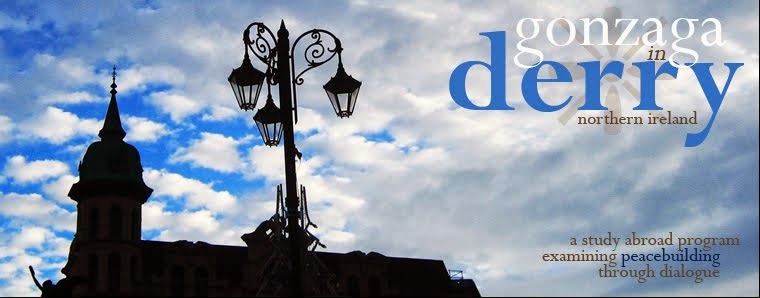“I stand before you a grandfather and a father. I stand before you a convicted terrorist.” James Greer bared his soul to his people, his friends, and his former enemies in 2011 as he spoke these poignant words during the dedication of the Peace Bridge to the people of Derry. How he came to make this confession is quite a story.
 |
| James Greer |
As a young boy growing up in Derry James was surrounded by utter disregard for human life. In 1966, when James was only 11-years-old, he and some friends were playing on a wooden plank by the River Foyle. As they were returning to the bank, the plank toppled and 7-year-old Thomas plummeted into the rushing river. James raced for help, but the old man he stopped simply drove away not wanting to get involved. James ran back down to the bank searching desperately for some sign of his friend, finally spotting Thomas a short way down the bank, his mop of red hair bobbing up and down in the rushing water. James tried with all his might to save him, but just grazed his hand before the tide swept Thomas away for good. Upon his return home that evening his mother simply said, “Get out of those wet clothes.” They found Thomas drowned three days later, the same red hair floating in the water, like seaweed lingering on the surface of the ocean. James could not help but be impacted with the realization that his was the last face Thomas saw before he died; James the last person he had touched. At the tender age of 11, James had a burden that was his alone to bear. A burden he would carry forever.
 |
| James reminiscing in the green room. |
 |
| Theatre of Witness |
When James was first invited to the Playhouse situated just inside the city walls, he chose to park just outside the walls in the Fountain area. He walked in through the gate focused on his mission, but as he started down the street his steps began to slow as he filled with uneasiness. He turned around, thinking he could not and should not do this. He quickly paced back to his vehicle in the Fountain, where he had come from, where he was safe, where he felt he should be. When he reached his vehicle James was overwhelmed by the shame of what he had done yet completely afraid of what he was about to do. He wanted desperately to tell his story, to move on, and it was from that desperation that he found the strength to walk back to the Playhouse and begin his new journey.
 |
| James found his light on stage. |
For James, the story telling was therapeutic. He performed 14 times in that first year. 14 times he sat on stage and told his story inches away from an enthralled audience. 14 times the audience lived his deep emotional trauma, their empathy forever joining them in that moment. 14 times he shared space and time with five other narrators, all of whom were former enemies, and had now become not only friends but family. As we sat talking in the green room at the Playhouse, James conjured up the image from Gulliver’s Travels. He felt as Gulliver dragging the ships, carrying the burden on the human soul, carrying the weight of his secrets. The more James told his story, the more weight he was able to release. As the burden started falling off, the ships would sink behind him one by one. James said it best when he stated, “The medicine is in the story.” What they did was not worth the life of one person, let alone the thousands who lost their lives during the Troubles.
“As much as you would like to change the past you can’t but you can live with it and change the future.”
 |
| The Playhouse |
Today James is thankful for what he has done, yet he realizes what it has cost him. “My people would believe I had turned my back on them as a traitor. They would see it as the ultimate betrayal of my people and my beliefs. But I know that what I am doing now is better than killing people. Of course it is.” The light and peace that now emanates from James does not go unnoticed. He realizes the peace journey is a work in progress, one that will never truly be complete, but it he can now carry his wounds with more ease and help others who are suffering. Not only has James brought peace to himself, he is hoping to reach outside of the historical conflict between Catholic and Protestant, Nationalists and Unionists, to include the local ethnic minorities, who are severely marginalized in Derry today. He would like to someday create a hub, a common ground, where those minorities would be welcome. His plan for a peaceful gathering place in Derry would include the peripheral ring of society as well as all those who have been involved with the struggle for so long. After many years of turmoil James realizes that peace building must be for all.



No comments:
Post a Comment